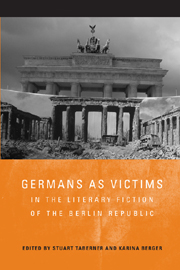Book contents
- Frontmatter
- Contents
- Acknowledgments
- Introduction
- 1 W. G. Sebald and German Wartime Suffering
- 2 The Natural History of Destruction: W. G. Sebald, Gert Ledig, and the Allied Bombings
- 3 Expulsion Novels of the 1950s: More than Meets the Eye?
- 4 “In this prison of the guard room”: Heinrich Böll's Briefe aus dem Krieg 1939–1945 in the Context of Contemporary Debates
- 5 Family, Heritage, and German Wartime Suffering in Hanns-Josef Ortheil, Stephan Wackwitz, Thomas Medicus, Dagmar Leupold, and Uwe Timm
- 6 Lost Heimat in Generational Novels by Reinhard Jirgl, Christoph Hein, and Angelika Overath
- 7 “A Different Family Story”: German Wartime Suffering in Women's Writing by Wibke Bruhns, Ute Scheub, and Christina von Braun
- 8 The Place of German Wartime Suffering in Hans-Ulrich Treichel's Family Texts
- 9 “Why only now?”: The Representation of German Wartime Suffering as a “Memory Taboo” in Günter Grass's Novella
- 10 Rereading Der Vorleser, Remembering the Perpetrator
- 11 Narrating German Suffering in the Shadow of Holocaust Victimology: W. G. Sebald, Contemporary Trauma Theory, and Dieter Forte's Air Raids Epic
- 12 Günter Grass's Account of German Wartime Suffering in Beim Häuten der Zwiebel: Mind in Mourning or Boy Adventurer?
- 13 Jackboots and Jeans: The Private and the Political in Uwe Timm's Am Beispiel meines Bruders
- 14 Memory-Work in Recent German Novels: What (if Any) Limits Remain on Empathy with the “German Experience” of the Second World War?
- 15 “Secondary Suffering” and Victimhood: The “Other” of German Identity in Bernhard Schlink's “Die Beschneidung” and Maxim Biller's “Harlem Holocaust”
- Works Cited
- Notes on the Contributors
- Index
2 - The Natural History of Destruction: W. G. Sebald, Gert Ledig, and the Allied Bombings
Published online by Cambridge University Press: 05 February 2013
- Frontmatter
- Contents
- Acknowledgments
- Introduction
- 1 W. G. Sebald and German Wartime Suffering
- 2 The Natural History of Destruction: W. G. Sebald, Gert Ledig, and the Allied Bombings
- 3 Expulsion Novels of the 1950s: More than Meets the Eye?
- 4 “In this prison of the guard room”: Heinrich Böll's Briefe aus dem Krieg 1939–1945 in the Context of Contemporary Debates
- 5 Family, Heritage, and German Wartime Suffering in Hanns-Josef Ortheil, Stephan Wackwitz, Thomas Medicus, Dagmar Leupold, and Uwe Timm
- 6 Lost Heimat in Generational Novels by Reinhard Jirgl, Christoph Hein, and Angelika Overath
- 7 “A Different Family Story”: German Wartime Suffering in Women's Writing by Wibke Bruhns, Ute Scheub, and Christina von Braun
- 8 The Place of German Wartime Suffering in Hans-Ulrich Treichel's Family Texts
- 9 “Why only now?”: The Representation of German Wartime Suffering as a “Memory Taboo” in Günter Grass's Novella
- 10 Rereading Der Vorleser, Remembering the Perpetrator
- 11 Narrating German Suffering in the Shadow of Holocaust Victimology: W. G. Sebald, Contemporary Trauma Theory, and Dieter Forte's Air Raids Epic
- 12 Günter Grass's Account of German Wartime Suffering in Beim Häuten der Zwiebel: Mind in Mourning or Boy Adventurer?
- 13 Jackboots and Jeans: The Private and the Political in Uwe Timm's Am Beispiel meines Bruders
- 14 Memory-Work in Recent German Novels: What (if Any) Limits Remain on Empathy with the “German Experience” of the Second World War?
- 15 “Secondary Suffering” and Victimhood: The “Other” of German Identity in Bernhard Schlink's “Die Beschneidung” and Maxim Biller's “Harlem Holocaust”
- Works Cited
- Notes on the Contributors
- Index
Summary
FIRST PUBLISHED IN 1956, Gert Ledig's novel Vergeltung (Payback) is an unremittingly brutal account of sixty-nine minutes of an Allied air raid on a German city toward the end of the war. Following the success of his first novel, Stalinorgel (The Stalin Organ, 1955), a similarly stark narration of warfare on the Eastern front, Ledig had been celebrated and invited to meetings of the Group 47. The novel Vergeltung, by contrast, was uniformly dismissed by critics as everything from unrealistic and sensationalist to badly written and ungrammatical. It achieved none of the commercial success of the first novel and sank, along with Ledig's literary career, into obscurity.
The novel was rediscovered and republished in 1999 in response to the debate surrounding W. G. Sebald's Luftkrieg und Literatur (Airwar and Literature, published in English as On the Natural History of Destruction) of the same year. The critical response to Sebald's thesis — that the bombings and their aftermath had been poorly represented in German literature — centered on the notion of a taboo on representing German suffering. Contributors to the debate either praised Sebald for bringing forgotten suffering into the public realm, or rejected his taboo theory by pointing to the existence of many postwar texts in which the bombs and the ruins were featured. Volker Hage championed Ledig's Vergeltung as a forgotten masterpiece that went some way to disproving Sebald's argument.
- Type
- Chapter
- Information
- Publisher: Boydell & BrewerPrint publication year: 2009

